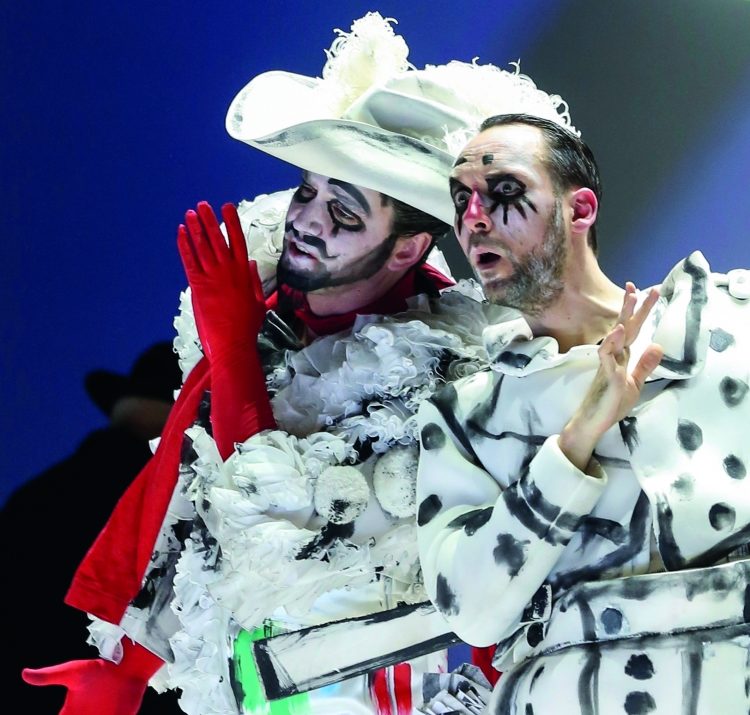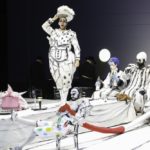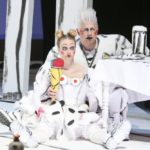 Volksoper’s stage is an expanse of white. Is it a puppet theatre with actors in burlesque outfits miming? Don Giovanni (Günter Haumer) bounds onto the white stage with its cut out – hotel, church – minimalist props. Director, set and costume designer Achim Freyer’s concept is like a ‘masque’, with its clown-like costumes. But Mozart and Da Ponte’s opera isn’t comic opera, it’s ultimately deadly serious, dramma giocoso, mixing serious and comic. At least the music is in safe hands, Alfred Eschwe, conducting Volksoper Orchestra, the Overture is beautifully played.
Volksoper’s stage is an expanse of white. Is it a puppet theatre with actors in burlesque outfits miming? Don Giovanni (Günter Haumer) bounds onto the white stage with its cut out – hotel, church – minimalist props. Director, set and costume designer Achim Freyer’s concept is like a ‘masque’, with its clown-like costumes. But Mozart and Da Ponte’s opera isn’t comic opera, it’s ultimately deadly serious, dramma giocoso, mixing serious and comic. At least the music is in safe hands, Alfred Eschwe, conducting Volksoper Orchestra, the Overture is beautifully played.
Stage hands in black contrast with the white theme; astonishingly, men in black coats are sitting at the back of the stage fishing, under a full moon. (Is this an ‘absurdist’ subtext- like Samuel Becketts’s tramps?)
Leporello (Stefan Cerny), Don Giovanni’s side-kick, complains he has to keep watch outside, while his master’s enjoying himself. Cerny is dressed as a clown, but his bass is impressive, one of the show’s successes, and he really enters into the comic role, if overdone. Haumer’s Don Giovanni appears like some alien from a sci-fi movie, in a one-piece white silk outfit, wearing a red headband and scarf, his arms blood red. Facially, he’s like a Johnny Depp pirate. As the Commandant, whose house Giovanni breaks into, bass-baritone Yasushi Hirano, resembles a priest, wearing a pointed hat. So far beautiful singing, but dramatically out of sinc. And the black t-shirted stage hands, intrusively invading the stage, subvert any sense of real dramatic tension.
Donna Anna (Kristiane Kaiser) – who struggled to repulse Giovanni, and whose cries alerted her father – returns, (with fiance Ottavio), to find her father killed. Dear father! The Commandant, now a black statue, revolves on the white dining table. Don Ottavio (JunHo You), with blue hair, as if cross-dressed in a vast dress, (or is it a housecoat?), has arrived too late. Donna-Anna, also blue-haired, swears Ottavio to avenge her father. But nothing is credible in this mess.
 Leporello has sneaked in to hide under that ever-revolving table. In the plot he joins nobleman Giovanni- suddenly arrived- who swears on his honour to apprehend the ‘intruder’. But Haumer, an impressive bass-baritone, sings already planning his next conquest: he’s in love with ‘a mysterious beauty.’
Leporello has sneaked in to hide under that ever-revolving table. In the plot he joins nobleman Giovanni- suddenly arrived- who swears on his honour to apprehend the ‘intruder’. But Haumer, an impressive bass-baritone, sings already planning his next conquest: he’s in love with ‘a mysterious beauty.’
Donna Elvira (Manuela Leonhartsberger) is a space goddess, with pointed blond spikes emanating from her hair: a sun goddess. In her powerful aria: where did he escape to, this man she loves, who conned her? He laughs at her pain. Leonhartsberger is a (distinguished) light mezzo soprano, it’s pleasantly sung; but she lacks gravitas in the part. (Giovanni approaches the lady, retreating when he realises it’s Elvira, the fiance he jilted.)
Leporello, still in that clown suit, launches into his bravura ‘catalogue’ aria- she was one in a list of conquests in every land. He boasts of the Don’s exploits to illustrate his pulling power. Cerny unfolds a concertina of cards; stage hands (again) walk on, carrying multiple portraits – including some illustrating body parts.( Giovanni loves blondes most of all.) Cerny’s solid bass here lacks variation; so the aria, adequately sung, runs out of steam. It should have us on the edge of our seats. All this novelty- in no way enlightening- is exhausting.
The country wedding: lots of cameras, thankfully not from the audience. Giovanni appears (incognito) at Zerlina and Masetto’s wedding, abusing his position of grand seigneur to seduce the bride, who’s all too willing. Masetto (Daniel Ohlenschläger) in punky blonde hair (is it a wig?) is a pushover. Zerlina (Theresa Dax) is like a fairy, with robotic movements,  (a little like the automaton in Offenbach’s Tales of Hoffmann), in white polka-dot frock with red boots, her face doll-like with rouged cheeks, and bunny hairdo. The Don sits opposite, devouring her.
(a little like the automaton in Offenbach’s Tales of Hoffmann), in white polka-dot frock with red boots, her face doll-like with rouged cheeks, and bunny hairdo. The Don sits opposite, devouring her.
But Donna Elvira, has come to warn Zerlina; with Anna and Ottavio, disguised, they’ve come to poop Giovanni’s party. Donna Anna suddenly realises the identity of the the man who killed her father: it was indeed Don Giovanni. She swears revenge, Kristine Kaiser outstanding in this chilling, moving aria. Yet even this most beautiful moment is marred: by a black-clad figure crawling under the table.
Ottavio, standing by, sings, vowing to do everything for her peace of mind. He cannot believe Giovanni, a nobleman, could have done it. (That patriarchal thing, men protecting their honour.) But, this time he rises to the occasion. She is his to protect: her happiness is his. (Dalla sua pace.) A star aria, but Hirano’s tenor, technically accomplished, was only average.
Giovanni has invited Zerlina/Masetto’s wedding guests to a banquet at his palace. The occasion for Giovanni’s signature aria, irresistible, sung by Haumer, standing on the banqueting table. Masetto is of course furious with Zerlina. Just to liven things up, Ohlenschläger’s Masetto appears suddenly in the theatre stalls – armed with a broom, as if to strike his unfaithful Zerlina.
Zerlina’s aria, reassuring jealous Masetto, is not a success- even the cello solo seems off-key. Dax is more engaged with the broom handle. The beautiful Zerlina- not in that outfit- is secreted away, Masetto fobbed off. But the three avengers- Elvira, Anna, Ottavio, foregrounded front of stage- come to her rescue. The famous closing ensemble, well sung, is not quite enough to rescue this messy staging.
I suffered the second Act, readers, so you don’t have to. Leporello refuses to serve his master anymore, but Giovanni’s gold buys him off. Giovanni and Leporello swop outfits. Leporello, impersonating the Don, is to woo and distract Elvira- as if she wouldn’t tell the difference?- so Giovanni can seduce her maid. Elvira’s on her balcony, Leonhartsberger’s, spiky hair now pink, matching pink leather case. Cerni’s Leporello serenades her, appears to mime, as if playing the mandolin. Can’t they afford one? Then Giovanni’s serenading Elvira’s maid. But also miming, playing supposedly a ‘mandolin’, that breaks apart.
Zerlina’s exquisite aria, comforting Masetto, who’s been beaten up by Giovanni, is better than her previous (Act 1) aria. She carries him off with a broom. (With this farce, we’re in the world of Zauberflöte, but not what Mozart intended.)
Ottavio’s marvellous aria, promising to save Anna, and wishing to bring forward their marriage, is pleasing, but unexceptional: not helped by that ridiculous dress You has to wear. But Donna Anna’s aria is a highlight: reproving Ottavio, assuring him of her love, but vowing her father be avenged first. A blissful moment. Kaiser, immaculately sung in this moving aria, almost redeems this dud production.
Elvira determined to break with Giovanni, Leonhartsberger – still with those spikes – sings of the conflict in her heart, about the Don’s dark soul: he who lied to her, but still loves. She tries to warn him of impending doom. But Leonhartsberger is too lightweight, and in that outfit?
We now see the Commandant on the revolving plinth. We know the end is in sight. (Mercifully.) Yet Giovanni’s nemesis is not unconvincing: unrepentant, he’s dragged down by flailing hands. The moonlit gloom is transformed by brilliant lighting, the sun represented by a gold chandelier. But whereas Mozart/Da Ponte’s ending is ambivalent, untriumphant, we actually see the Commandant resurrected: the ‘survivors’ all meet for a banquet at ‘Ristorante Giovanni‘ Wien. Oh, please! The audience enjoyed it, but I’m here to warn you! PR 2.01.2020
Photos: Don Giovanni (Günter Haumer) and Leporello (Stefan Cerny); Leporello (Stefan Cerny); Mara Mastalir (Zerlina) and Daniel Ohlenschläger (Masetto)
(c) Barbara Palffy/ Volksoper Wien
